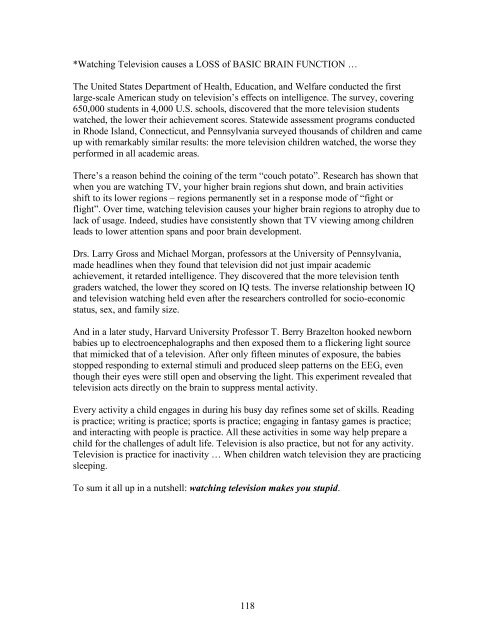Licking the Razor's Edge (2015)
Recognizing the hidden addictions that bind you, … to then set your True Self free
Recognizing the hidden addictions that bind you,
… to then set your True Self free
Create successful ePaper yourself
Turn your PDF publications into a flip-book with our unique Google optimized e-Paper software.
*Watching Television causes a LOSS of BASIC BRAIN FUNCTION …<br />
The United States Department of Health, Education, and Welfare conducted <strong>the</strong> first<br />
large-scale American study on television’s effects on intelligence. The survey, covering<br />
650,000 students in 4,000 U.S. schools, discovered that <strong>the</strong> more television students<br />
watched, <strong>the</strong> lower <strong>the</strong>ir achievement scores. Statewide assessment programs conducted<br />
in Rhode Island, Connecticut, and Pennsylvania surveyed thousands of children and came<br />
up with remarkably similar results: <strong>the</strong> more television children watched, <strong>the</strong> worse <strong>the</strong>y<br />
performed in all academic areas.<br />
There’s a reason behind <strong>the</strong> coining of <strong>the</strong> term “couch potato”. Research has shown that<br />
when you are watching TV, your higher brain regions shut down, and brain activities<br />
shift to its lower regions – regions permanently set in a response mode of “fight or<br />
flight”. Over time, watching television causes your higher brain regions to atrophy due to<br />
lack of usage. Indeed, studies have consistently shown that TV viewing among children<br />
leads to lower attention spans and poor brain development.<br />
Drs. Larry Gross and Michael Morgan, professors at <strong>the</strong> University of Pennsylvania,<br />
made headlines when <strong>the</strong>y found that television did not just impair academic<br />
achievement, it retarded intelligence. They discovered that <strong>the</strong> more television tenth<br />
graders watched, <strong>the</strong> lower <strong>the</strong>y scored on IQ tests. The inverse relationship between IQ<br />
and television watching held even after <strong>the</strong> researchers controlled for socio-economic<br />
status, sex, and family size.<br />
And in a later study, Harvard University Professor T. Berry Brazelton hooked newborn<br />
babies up to electroencephalographs and <strong>the</strong>n exposed <strong>the</strong>m to a flickering light source<br />
that mimicked that of a television. After only fifteen minutes of exposure, <strong>the</strong> babies<br />
stopped responding to external stimuli and produced sleep patterns on <strong>the</strong> EEG, even<br />
though <strong>the</strong>ir eyes were still open and observing <strong>the</strong> light. This experiment revealed that<br />
television acts directly on <strong>the</strong> brain to suppress mental activity.<br />
Every activity a child engages in during his busy day refines some set of skills. Reading<br />
is practice; writing is practice; sports is practice; engaging in fantasy games is practice;<br />
and interacting with people is practice. All <strong>the</strong>se activities in some way help prepare a<br />
child for <strong>the</strong> challenges of adult life. Television is also practice, but not for any activity.<br />
Television is practice for inactivity … When children watch television <strong>the</strong>y are practicing<br />
sleeping.<br />
To sum it all up in a nutshell: watching television makes you stupid.<br />
118


















